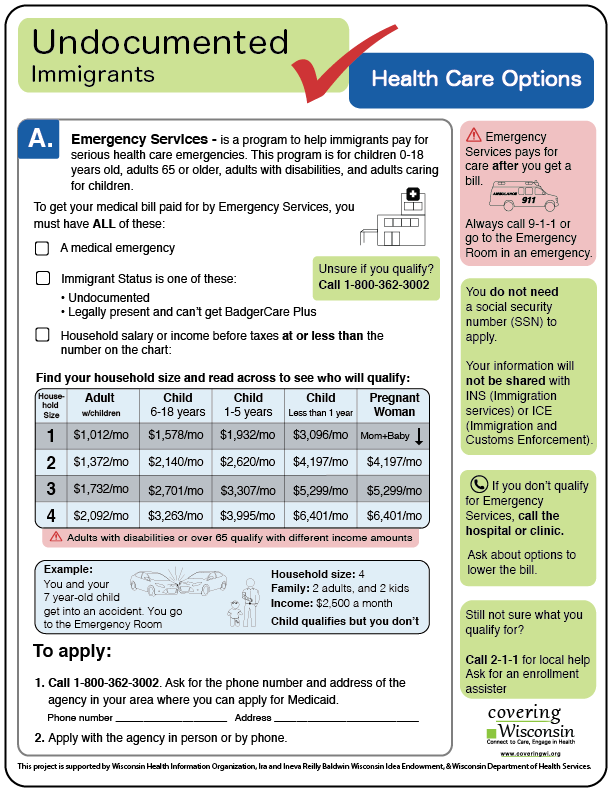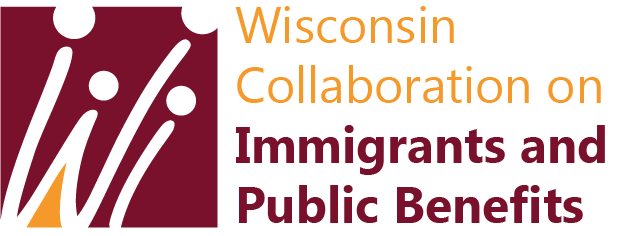
What are my health insurance options?
Read below to learn about:
Options for health insurance
Getting help to pay for health care
Free clinics and community health centers
What to do if you can’t pay your medical bill
Health Insurance and Care Options for Immigrants who are Lawfully Present
-
Many immigrants who are legally present can get health insurance from their job.
If your health insurance isn’t affordable, you may be able to get financial help from Healthcare.gov to get a more affordable plan. It is best to work with an expert to see if your plan is affordable.
When can I apply? November 1-January 15
-
Legally present immigrants may be eligible for Medicare. However, if they must pay for Medicare part A, they can also apply for health insurance on Healthcare.gov.
Financial help is based on income. It is best to work with an expert since this process can be tricky.
-
This is State of Wisconsin Medicaid for people with low incomes. There are special rules for immigrants to qualify for this program. It is best to work with an expert.
Important: Children's enrollment in BadgerCare Plus or any public benefit program won’t hurt their parents’ immigration status!
When can I sign up? Anytime
The most common status to qualify are:
U.S. citizens including Puerto Rico, Guam, U.S. Virgin Islands, Northern Mariana Islands, and naturalized citizens
U.S. nationals (American Samoa)
Permanent residents (adults have a 5 year wait period)
Refugees and asylees
Visa types, such as for victims of domestic abuse or human trafficking
Iraq/Afghan Special Immigrant Visa holders
Granted Withholding of Deportation or Removal
To see income requirements, Click Here.
-
Most people who are legally present can qualify for a health plan on Healthcare.gov. Financial help is based on income.
People with low income who don’t qualify for BadgerCare Plus or Medicaid can often get $0 plans.
Financial help from Healthcare.gov is called tax credits and is not a public benefit. Using tax credits will not hurt anyone’s immigration status. Sponsors of immigrants don’t need to pay back tax credits.
Tourists, and those who are undocumented don’t qualify for plans on Healthcare.gov
When can I sign up?
November 1 - January 15
When you lose other coverage
Your immigration status changes
-
People who live in the US on a Deferred Action for Childhood Arrivals (DACA) status will be eligible for health insurance on Healthcare.gov starting November 1, 2024 and may be able to get financial help.
When can I apply? November 1-January 15.
Programs DACA recipients can also apply for or use to get care:
Health insurance from a job
Sliding scale discounts at Community Health Centers
Free clinics
Prenatal Care Program
Emergency Services
Charity care programs
-
The Wisconsin Well Woman Program helps women who have little or no health insurance get screening for breast and cervical cancers.
-
This is a program for anyone who is pregnant regardless of immigration status. It will pay for any care of the mom while pregnant until 90 days after giving birth. Children born in the US can then apply for BadgerCare Plus.
-
Community health centers have financial help to lower the bill. They offer discounts based on income to anyone regardless of immigration status or type of insurance.
Free clinics often serve anyone in the community who needs care. However, they may have fewer doctors and may not serve people who have health insurance. Find a free clinic or community health center.
-
According to HealthCare.gov, the term “lawfully present” includes immigrants who have:
“Qualified non-citizen” immigration status.
Humanitarian statuses or circumstances (including Temporary Protected Status, Special Juvenile Status, asylum applicants, Convention Against Torture, victims of trafficking).
Valid non-immigrant visas.
Legal status conferred by other laws (temporary resident status, LIFE Act, Family Unity individuals). Get a full list of immigration statuses eligible for Marketplace coverage.
It is common for children and adults to be on different plans. Some of these programs have special rules for immigrants and an expert can help you understand your options.
All personal information about the family is private and won’t be shared with Immigration. To learn more, go to dhs.wi.gov/noncitizens
Children's enrollment in BadgerCare Plus or any public benefit program will not hurt their parents’ immigration status!
Healthcare Options for People who are Undocumented
-
This is a program for anyone who is pregnant regardless of immigration status. It will pay for any care of the mom while pregnant until 90 days after giving birth. Children born in the US can then apply for BadgerCare Plus.
-
The Wisconsin Well Woman Program helps women who have little or no health insurance get screening for breast and cervical cancers.
-
This program helps immigrants who don’t have other insurance or who are undocumented pay for health care emergencies for children, caregivers, adults with disabilities, and adults over age 65.
Only serves some populations:
Children 0-18 years old
Adults 65 or older
Adults with disabilities
Adults caring for children at home
Pregnant women
-
Community health centers have financial help to lower the bill. They offer discounts based on income to anyone regardless of immigration status or type of insurance.
Free clinics often serve anyone in the community who needs care. However, they may have fewer doctors and may not serve people who have health insurance.
-
What Can I Do? I Can’t Pay My Medical Bill
Have questions or need help finding out what you qualify for?
Find free, local help by making an appointment with a Navigator.


